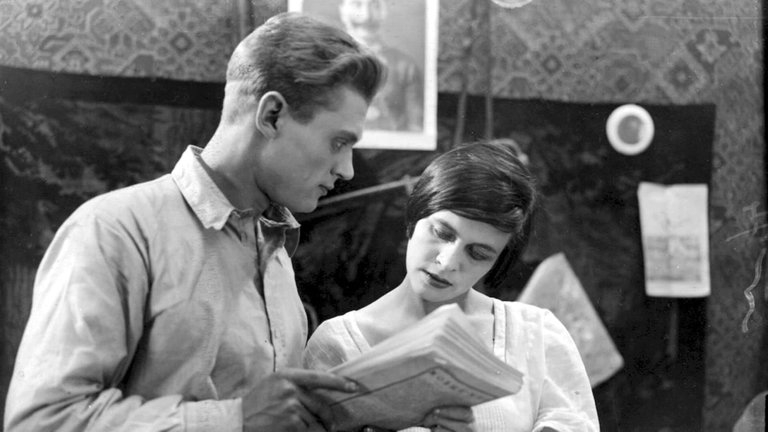Film Review: Bed and Sofa (Tretya Meshanskaya, 1927)

One of the more overlooked aspects of early Soviet history is Bolshevik regime’s attempts to create new society through near complete break with tradition, which was replaced by various experiments and introduction of new sexual mores that look incredibly enlightened and progressive from today’s Western perspective. Those trends, which were most evident in 1920s, found their way into Soviet cinema, and the best known example is Third Meshanskaya, 1927 silent film directed by Abram Room, best known in English-speaking world under title Bed and Sofa.
The plot takes place in Moscow. Volodya (played by Vladimir Fogel) is young printer who came to the city to work in print shop, but finds that work doesn’t mean that he can expect accommodation. Thankfully, he is met on the street by Kolya (played by Nikolai Batalov), young construction foreman with whom he served in Red Army during Civil War. Kolya offers Volodya to use sofa in the small cramped up apartment in Third Meshanskaya Street, where he lives with his wife Liuda (played by Lyudmila Semionova). Liuda isn’t happy, but when Kolya leaves on business trip Volodya easily seduces her. When Kolya learns about it, he is angry and leaves only to return and agree to share Liuda with his best friend. Things get complicated when Liuda becomes pregnant and, since she can’t say who is the father, both men insist on abortion. While waiting for procedure in private clinic, Liuda decides to keep the baby and leave both men.
Abram Room had good fortune to make this film in a period while New Economic Policy still allowed something of a private sector within Soviet economy and regime’s handling of culture didn’t include suffocating yoke of Socialist Realism. This allowed him and his screenwriter Viktor Shklovsky to deal with realities of life in Soviet state in a way that wasn’t too flattering to the regime. The entire plot is built on housing shortage in Soviet capital and those who happen to find accommodation are often forced to share it. But it was depiction of new sexual mores that caught much more attention and, ironically, made Bed and Sofa have more problems with censorship in the West than in Soviet Union itself. These include very frank and uncomfortable dealing with the issue of abortion, which became legal in Soviet Russia few years earlier. But more interesting is depiction of relationship of three main characters as ménage à trois – something that was decades ahead of its time and would be first depicted in the West in Truffaut’s Jules and Jim. Room and Shklovsky actually found inspiration for the plot in the relationship of famous poet Mayakovsky, his muse Lilya Brik and her husband Osip Brik. Bed and Sofa can also be interpreted as feminist film, especially during the ending in which Liuda makes somewhat unexpected decision that was quite unusual for cinema at the time.
Room’s direction is solid, but, despite outrageousness of the theme, his tone is very subdued and Bed and Sofa would require more patience from today’s audience than many other silent classics. While Nikolai Batalov and Vladimir Fogel, two big stars of 1920s Soviet cinema, give great performances, Lyudmila Semionova is not that convincing as object of their characters’ affections. Perhaps that can be explained with aesthetic standards of 1920s Soviet Russia being very different from our own. In any case, Bed and Sofa gives an interesting insight into everyday life of ordinary people nearly century ago and for that deserves recommendation, at least for more curious segments of audience.
RATING: 6/10 (++)
Blog in Croatian https://draxblog.com
Blog in English https://draxreview.wordpress.com/
Leofinance blog https://leofinance.io/@drax.leo
Unstoppable Domains: https://unstoppabledomains.com/?ref=3fc23fc42c1b417
Hiveonboard: https://hiveonboard.com?ref=drax
Bitcoin Lightning HIVE donations: https://v4v.app/v1/lnurlp/qrcode/drax
Rising Star game: https://www.risingstargame.com?referrer=drax
1Inch: https://1inch.exchange/#/r/0x83823d8CCB74F828148258BB4457642124b1328e
BTC donations: 1EWxiMiP6iiG9rger3NuUSd6HByaxQWafG
ETH donations: 0xB305F144323b99e6f8b1d66f5D7DE78B498C32A7

Thank you for a thought provoking review. I have studied Soviet history for many decades and not heard of this film. There were several leading Bolsheviks who sponsored the free expression of the arts such as Lunarcharsky before he later fell foul of Stalin. Socialist Realism reflected on the cultural level Stalin's consolidation of his grip on power. It was anathema to the ideals of Lenin and his co thinkers in 1917.
The only Soviet film director I know from this period is Eisenstein so thank you for bringing this director to our attention.